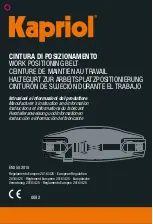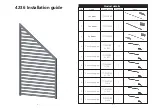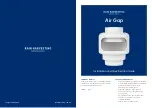
Chapter |
Safety
Confidential, limited rights
PN 103261 | Revision D | 23-Oct-2019
User Manual
Page
13
Liquid nitrogen (LN2)
Liquid Nitrogen is a cryogen (-196 °C) and should be handled with care and with appropriate
personal protective equipment (eye protection, cryo gloves,lab coat). Direct contact with liquid
nitrogen will cause severe frostbite of skin and eyes. A 4.0 l container for the Liquid Nitrogen
is recommended to work near the Vitrobot, larger volumes are usually not required for a
Vitrobot session aiming at freezing 4-12 samples (= 4 to 12 grids).
The Vitrobot has a LN
2
container with a cup filled with liquid ethane to vitrify samples. Only
authorized personnel should carry out replenishment and the SDS for liquid Nitrogen (refer to
SDS overview) should be read and understood. The use of liquid Nitrogen can give a risk of
asphyxiation. Be careful when handling pressurized gas of any kind. Thermo Fisher Scientific
advises to install a separate oxygen detector in the room. Most cryogenic liquids are odorless,
colorless, and tasteless when vaporized. When cryogenic liquids are exposed to the
atmosphere the cold boil-off gases condense the moisture in the air, creating a highly visible
fog.
2.5.1 Liquid Nitrogen specific safety precautions
Wear safety goggles or a full faced mask and cryogenic gloves when handling Liquid
Nitrogen. Special clothing may be advisable. It is preferable to wear trousers outside of boots
or work shoes. Cryogenic gloves are for indirect or splash protection only, t hey are not
designed to protect against immersion into cryogenic liquids!
•
Always handle these liquids carefully to avoid skin burns and frostbite. Dewars must be
moved carefully. Sloshing liquid into warmer regions of the container can cause sharp
pressure rises. Carry the vessel with both hands and as far away from your face as
comfortably possible.
Summary of Contents for Vitrobot Mk IV
Page 1: ...PN 103261 Revision D 23 Oct 19 Vitrobot Mk IV User Manual ...
Page 38: ......














































